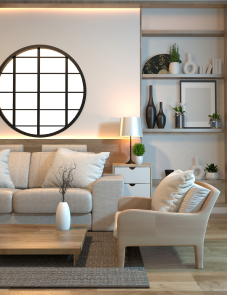Touring the Elevator Showroom
I just toured Signature Elevators in Rockville and talked to Gary Case, the owner, about residential elevator options.

We talked about various options available, such as the Stiltz Elevator, which uses an electric motor but does not need a separate machine room, or the more traditional Cambridge Elevating “full-size” elevator that you picture in your head when you think of elevators.

There are a variety of options and price points, everything from a $30,000 tube that takes you between two levels, to adding an addition on the exterior of your home and putting in a traditional elevator big enough for someone in a wheel chair with someone pushing them at $150,000 (or more. You can get lots of bells and whistles.) (I hear there are tax credits you can apply for. I’m investigating! I’ll share when I learn more.)

My parents are considering putting one in at their house and this is where the conversation first began. Our world is not accessible for people with disabilities. The first time I went shopping during Christmas madness while pushing a wheel chair taught me a lot! So making a home built in 1925 accessible has some fun challenges. We have been mulling over the best way to add an elevator to a house given so many questions…
Should we add an elevator?
What would future buyers think? What is the ROI on a project that could cost you $150,000!? I posted about the elevator on a real estate agent group on Facebook that I follow and got a lot of negative responses. A lot of people argued it offered no ROI at all. Some said it would be negative ROI, like a pool for people who don’t want one. Another said she had a buyer who purchased a house and asked the seller to remove the elevator because they didn’t want to pay for its maintenance (which appears to be $500-1000/yr depending on which model you own).
But for anyone who struggles with access due to a disability, I think it offers you something you can’t put a price on. It gives you independence. It allows you to move about your home, even if you aren’t feeling that well, even if you fell last week and have a sore muscle, even if you aren’t well and need to see a doctor but can’t do the stairs. If you are upstairs and can’t do the stairs, we are talking about having to call an ambulance. Even if you can walk, it allows you to carry heavy objects between levels without injuring yourself. And if you want or need an elevator, homes with them already installed are few and far between.
Where do you see elevators in homes?
I see them in new construction 4-level townhouses in Bethesda and Rockville. Baby boomers and young professionals alike don’t want to climb four levels to get to all parts of their house or to take their steak and wine to their roof top deck for a party. So why not in historic and beautiful Baltimore city? These great mansions were built before elevators were trending in homes. This house suddenly becomes accessible. And why should someone with a disability have to move into a ranch and rambler? If they want an estate-style home, why not? And as long as those buyers are in the market, there is an ROI on the installation of a well-done installation of a beautiful system like the Stiltz or the Cambridge.
Update in July 2021 – Comprehensive Guide on Home Elevator Costs by Happy DIY Home



